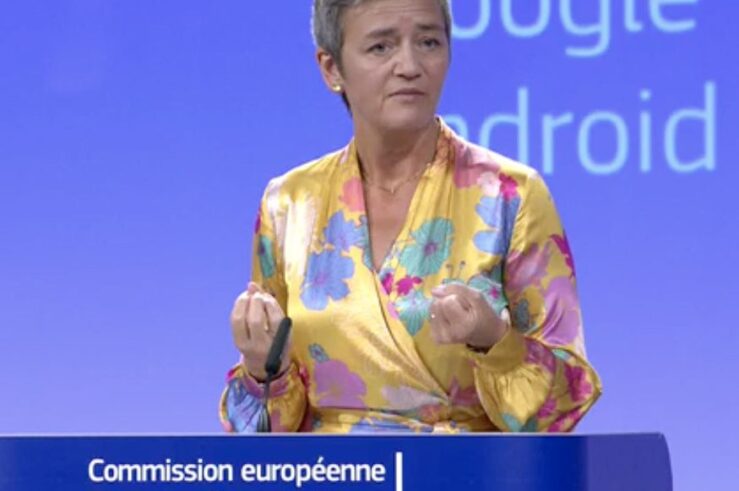Showing results for: “Valid C1000-170 Study Materials 🕗 C1000-170 Latest Exam Answers 🏮 Trusted C1000-170 Exam Resource 🦍 Search on 【 www.pdfvce.com 】 for 【 C1000-170 】 to obtain exam materials for free download 🐀Valid C1000-170 Dumps Demo”
Amazon-Whole Foods After One Year Symposium
One year ago tomorrow the Amazon/Whole Foods merger closed, following its approval by the FTC. The merger was something of a flashpoint in the growing populist antitrust movement, raising some interesting questions — and a host of objections from a number of scholars, advocates, journalists, antitrust experts, and others who voiced a range of possible problematic outcomes. Under settled antitrust law — evolved over ... Amazon-Whole Foods After One Year Symposium
Lambert & Sykuta Comment to FTC on Common Ownership
The Federal Trade Commission will soon hold hearings on Competition and Consumer Protection in the 21st Century. The topics to be considered include: The state of antitrust and consumer protection law and enforcement, and their development, since the [1995] Pitofsky hearings; Competition and consumer protection issues in communication, information and media technology networks; The identification ... Lambert & Sykuta Comment to FTC on Common Ownership
Lowering the Barriers to Entry to the Common Ownership Debate: A (Relatively) Non-Technical Explanation of MHHI Delta
One of the hottest topics in antitrust these days is institutional investors’ common ownership of the stock of competing firms. Large investment companies like BlackRock, Vanguard, State Street, and Fidelity offer index and actively managed mutual funds that are invested in thousands of companies. In many concentrated industries, these institutional investors are “intra-industry diversified,” meaning ... Lowering the Barriers to Entry to the Common Ownership Debate: A (Relatively) Non-Technical Explanation of MHHI Delta
Senator Warner’s retrogressive proposals could lead to arbitrary and capricious interventions that would harm entrepreneurs and consumers
Last week, I objected to Senator Warner relying on the flawed AOL/Time Warner merger conditions as a template for tech regulatory policy, but there is a much deeper problem contained in his proposals. Although he does not explicitly say “big is bad” when discussing competition issues, the thrust of much of what he recommends would ... Senator Warner’s retrogressive proposals could lead to arbitrary and capricious interventions that would harm entrepreneurs and consumers
E-cigarette taxation: Lessons from “sin taxes”
The Economist takes on “sin taxes” in a recent article, “‘Sin’ taxes—eg, on tobacco—are less efficient than they look.” The article has several lessons for policy makers eyeing taxes on e-cigarettes and other vapor products. Historically, taxes had the key purpose of raising revenues. The “best” taxes would be on goods with few substitutes (i.e., ... E-cigarette taxation: Lessons from “sin taxes”
AOL/Time Warner merger conditions are a template for disastrous tech policy
Senator Mark Warner has proposed 20 policy prescriptions for bringing “big tech” to heel. The proposals — which run the gamut from policing foreign advertising on social networks to regulating feared competitive harms — provide much interesting material for Congress to consider. On the positive side, Senator Warner introduces the idea that online platforms may ... AOL/Time Warner merger conditions are a template for disastrous tech policy
The European Commission’s Google Android decision takes a mistaken, ahistorical view of the smartphone market
What to make of Wednesday’s decision by the European Commission alleging that Google has engaged in anticompetitive behavior? In this post, I contrast the European Commission’s (EC) approach to competition policy with US antitrust, briefly explore the history of smartphones and then discuss the ruling. Asked about the EC’s decision the day it was announced, ... The European Commission’s Google Android decision takes a mistaken, ahistorical view of the smartphone market
Will the European Commission’s Google Android Decision Benefit Consumers?
By Pinar Akman, Professor of Law, University of Leeds* The European Commission’s decision in Google Android cuts a fine line between punishing a company for its success and punishing a company for falling afoul of the rules of the game. Which side of the line it actually falls on cannot be fully understood until the ... Will the European Commission’s Google Android Decision Benefit Consumers?
The EU’s Google Android antitrust decision falls prey to the nirvana fallacy
Today the European Commission launched its latest salvo against Google, issuing a decision in its three-year antitrust investigation into the company’s agreements for distribution of the Android mobile operating system. The massive fine levied by the Commission will dominate the headlines, but the underlying legal theory and proposed remedies are just as notable — and ... The EU’s Google Android antitrust decision falls prey to the nirvana fallacy
Why the EU’s Google Android Antitrust Fine May Harm R&D and Innovation
Regardless of which standard you want to apply to competition law – consumer welfare, total welfare, hipster, or redneck antitrust – it’s never good when competition/antitrust agencies are undermining innovation. Yet, this is precisely what the European Commission is doing. Today, the agency announced a €4.34 billion fine against Alphabet (Google). It represents more than ... Why the EU’s Google Android Antitrust Fine May Harm R&D and Innovation
Why the Commission’s Google Android decision harms competition and stifles innovation
Our story begins on the morning of January 9, 2007. Few people knew it at the time, but the world of wireless communications was about to change forever. Steve Jobs walked on stage wearing his usual turtleneck, and proceeded to reveal the iPhone. The rest, as they say, is history. The iPhone moved the wireless ... Why the Commission’s Google Android decision harms competition and stifles innovation
Correcting the Federalist Society Review’s Mischaracterization of How to Regulate
Ours is not an age of nuance. It’s an age of tribalism, of teams—“Yer either fer us or agin’ us!” Perhaps I should have been less surprised, then, when I read the unfavorable review of my book How to Regulate in, of all places, the Federalist Society Review. I had expected some positive feedback from ... Correcting the Federalist Society Review’s Mischaracterization of How to Regulate






